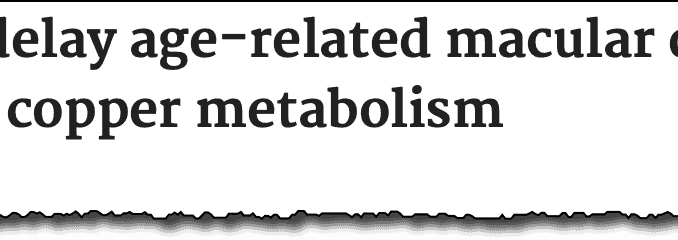
And they’re so cheap
Unsubscribe | Report as spam | Change email preferences
These 2 nutrients can help preserve eyesight
Age-related macular degeneration is a disease that starts with blurring of the central part of the vision.
It happens when the macula becomes damaged – this is part of the light-sensitive retina at the back of the eye.
It’s a common condition – the leading cause of vision problems for older adults.
It’s a common belief that this condition is simply caused by age alone.
But there are various foods, nutrients, and supplements which can significantly increase or decrease the risk of age-related macular degeneration.
These substances include copper and calcium.
The paper, based on human and animal research, was written by a scientist at the University of North Dakota. It was published in Medical Hypothesis.
The paper is a discussion about numerous lines of evidence which point toward the role of copper and calcium in preventing or slowing age-related macular degeneration.
The impetus for this hypothesis was findings from a human study which indicated that higher calcium consumption may slow age-related macular degeneration.
“Secondary analyses of data from the ARED study revealed that higher calcium intakes were associated with slower progression of age-related macular degeneration.”
Calcium is a very important nutrient – it lowers metabolic stress in the body and slows aging.
Calcium is very important for the health of the cell because it decreases cellular stress.
There is also evidence that copper reduces the risk of age-related macular degeneration – among other things.
“Primary analyses had already revealed that a copper supplement reduced the odds of developing age-related macular degeneration while lengthening life.”
Both copper and calcium have been decreasing in Western diets in recent decades – but the reduction in copper is most severe.
“Copper in the Western diet has been decreasing at least since the 1930s.”
The researcher began to wonder whether copper was influencing calcium metabolism – or the other way round.
“It is hypothesized that the association of calcium intakes with better vision was mediated by improved copper utilization of study participants who were eating too little copper.”
Calcium is a sort of a master nutrient – it has knock-on effects and a host of other nutrient -related processes in the body.
“Calcium can modify utilization of other dietary elements.”
And indeed, there is evidence that shows increasing dietary calcium does have an effect on copper.
Rodent experiments showed that animals fed more calcium retained more copper.
Even though all of the animals were being fed the same amount of copper.
“Romasz et al. fed rats a wide range of calcium. As dietary calcium increased , the concentration of copper in the liver increased (from 11 to 15 μg/dry g) though dietary copper was constant.”
There are many ways to assess how the body handles and stores copper.
The best way is to assess copper stores in the liver – although this is completely impractical in living humans for obvious reasons.
”Liver copper is the gold standard for assessing copper nutriture.”
Unfortunately, we know that many people are eating diets which have proven to be deficient in copper in human studies.
Many people are suffering from copper deficiency.
“Amounts of copper which proved insufficient for men and women in controlled studies are commonly consumed by the general population.”
The researchers believe the beneficial effect of copper in the eye may be partly due to its role in superoxide dismutase.
Superoxide dismutase is an enzyme which helps to break down free radicals…
…reducing oxidative stress that can otherwise cause damage to the eye (and the rest of the body).
“Observations on eye anatomy of animals deficient in copper and on decreased retinal superoxide dismutase in people with age-related macular degeneration support this hypothesis.”
Without enough copper – or enough calcium to retain copper…
…we may not be able to produce enough superoxide dismutase to break down the free radicals which may otherwise lead to age-related macular degeneration.
I’ve been a strong proponent of high calcium (high dairy) diets for a long time.
I recently researched and wrote a very interesting newsletter on the benefits of copper too.
This viable hypothesis gives yet another reason why we should be looking to consume more of these essential nutrients.
Dairy is a great source of calcium and goat milk has 5 times more copper than cows milk.
—-Important Message About Eye Health—-
These 10 cent drops are keeping away cataracts and enhancing my eyesight
I found these cost-effective, secure drops that are working wonders in fighting off cataracts and maintaining eye health.
My wife, Jodi, is using these drops to ease the strain on her eyes and minimize the fuzziness in her vision.
It’s a total contrast from the discomfort she experienced earlier.
Surprisingly, these incredibly valuable 10-cent drops are not something most doctors know about.
Despite this, these drops have a proven track record and numerous studies showing their benefits.
So, if you’re interested in trying these eye drops and want to share them with those you care about, you have the chance right now…
…because I’m unveiling this secret, plus a ton of others, when you get a complimentary copy of my top-rated book, Healthy to 120, usually priced at $29.95!
———-



